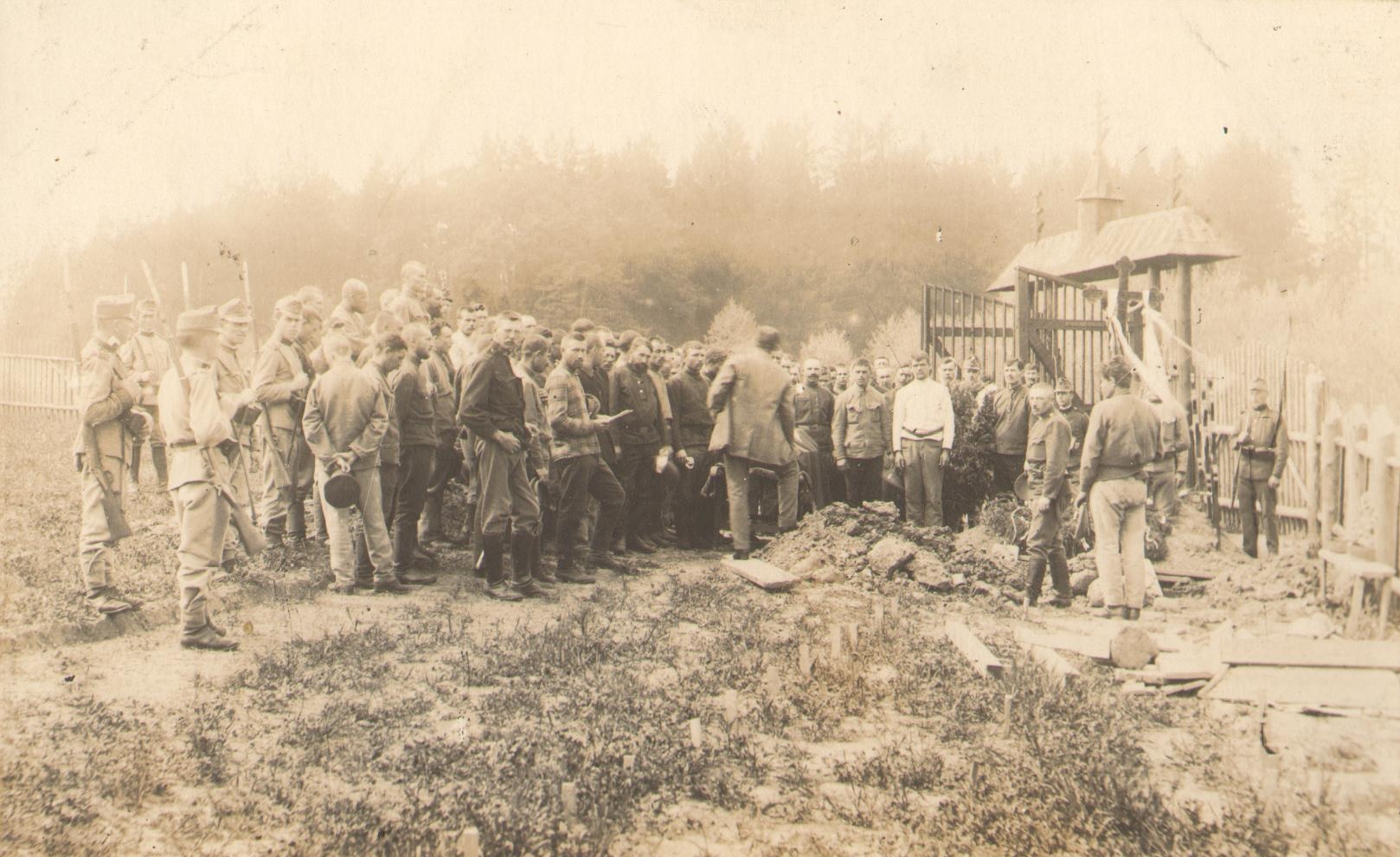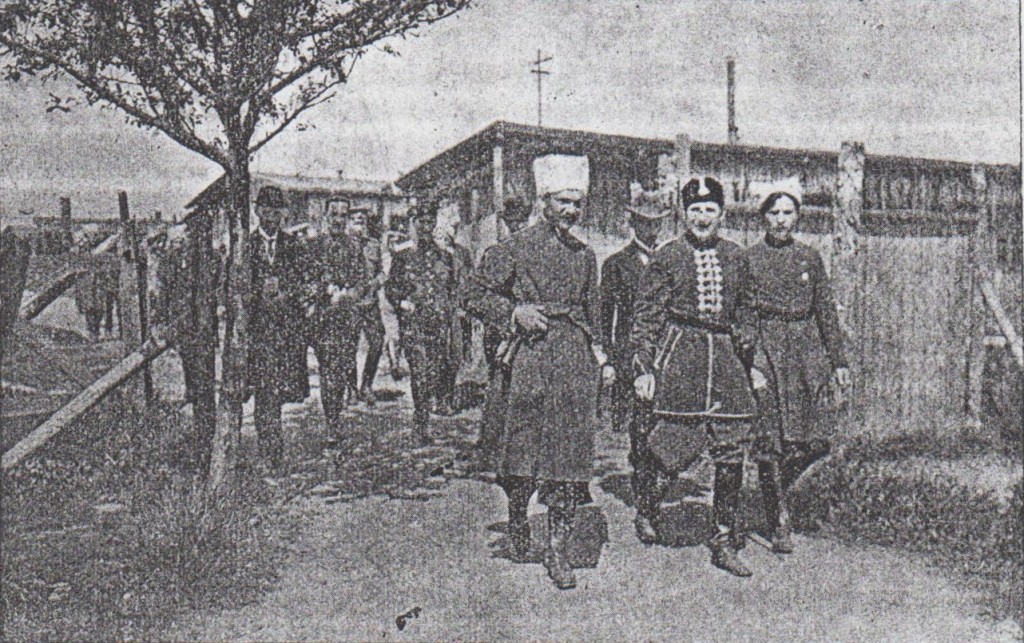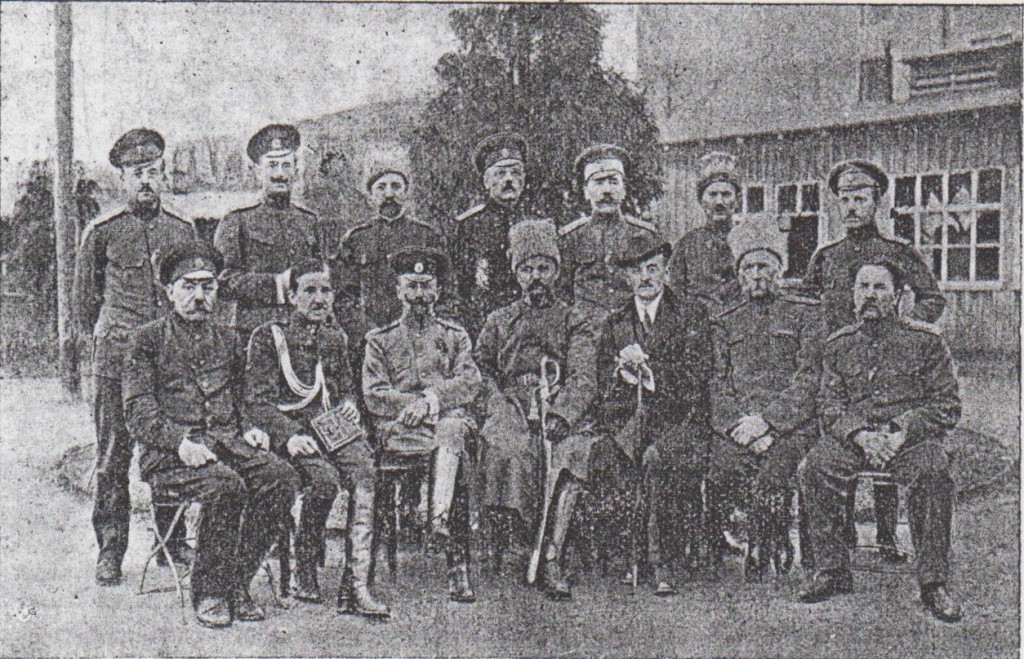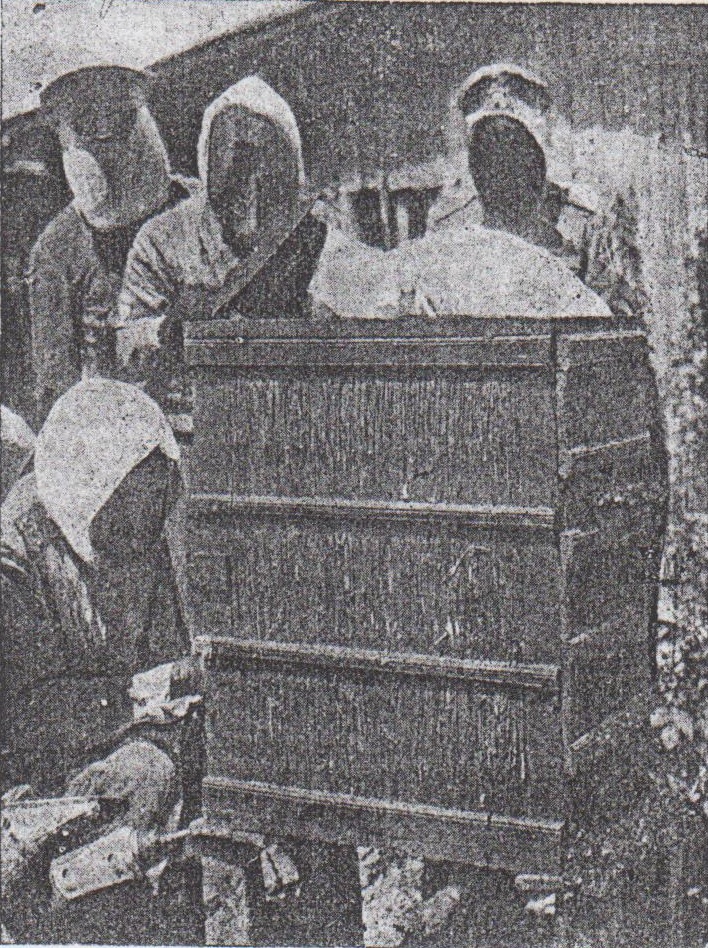
On the eve of the Russian Revolution, over a thousand and a half ethnically-conscious Ukrainians were prisoners at the Wetzlar internment camp in Germany. Part of them, about 250 men, stayed permanently at the camp, the rest being employed in labour formations. Those who stayed at the camp constituted the most nationally-conscious and active of the prisoners, and had organized a ‘Ukrainian community’. In it the educational and organizational process was developing most effectively, being much less intensive in the labour formations. We shall focus primarily on this group of the Ukrainian community.
When the ‘community’ was commemorating March the 11th in honour of Taras Shevchenko’s birthday, none of its members could even have imagined, that something grand was happening in Russia, that a revolution had just begun. The commemorations began under the aura of the Ukrainian people’s oppression, its subjugation to the Tsarist yoke, while Tsarism had already fallen in Russia.
Revolution had been anticipated by the Wetzlar-interned Ukrainians, as it was by those at Rastatt, but few thought that it would have taken off right during the war. Its beginning was a surprise. News of the revolution came on March the 15th and made a very strong impression. It had to happen especially since the Ukrainian prisoners of war that were stationed at the camp (the majority of them being deployed in labour formations) were experiencing a sort of apathy. The Shevchenko commemoration, which took place between March the 9th and the 11th, gave the community’s morale a boost, but it was only a temporary manifestation. In the end, the community had no notes of encouragement. The internment was becoming all the less bearable, with its end nowhere in sight. The unexpectedly cold winter and poor provisions at the camp also took their toll. Our prisoners were living at the camp cold and hungry, and that was depriving them of energy to work. The issue of further internment at the camp was most important for its inhabitants. Suppression and apathy was evident all amongst our prisoners, and with every week they were growing stronger. In March, exactly when the news of revolution in Russia had come, apathy was at its highest. A contributing role was also played by the foreign, political affairs.
On the political horizon nothing comforting was visible for the Ukrainian cause. On the one hand stood a Polish state with undefined Eastern borders, and on the other, the Russian forces were still pushing: Brusilov was still holding strongly a part of Eastern Galicia and Bukowina, both lonely lands, where Ukrainian national consciousness still was giving signs of life. At that stage the political platform of the ‘Union of Liberation of Ukraine’, which was based on the idea of Ukraine’s independence, had all the fewer chances of becoming realised, and was already only envisioned by minor groups within the community. For the other interned Ukrainians, only a revolution in Russia presented an opportunity, if not of political independence, then at least free national development.
Under those circumstances, the start of the revolution in Russia was like an electric current that electrified our prisoners at Wetzlar and brought them out of apathy. News of the revolution was so unexpected, that some of those at the camp would not believe them. Only further, more detailed news had ensured our prisoners, that something really extraordinary had happened in Russia, and that the mighty Tsarist rule had fallen.
Those news had caused, first of all, personal sentiments amongst the prisoners. Although interned, they felt themselves so free, that the responsibility before the Russian government for all the Ukrainian propaganda at the camp was gone. All the time before the revolution, they had thought that they were breeding hostility towards Russia. Some, those more engaged in Ukrainian propaganda, were even of the opinion that, perhaps, after the war, they would have to stay outside Russia. Now they had nothing to fear of.
The news from Russia were arriving one by one, and all of them showed that the Russian overthrow was a major affair, and that it was following a democratic path. Only Ukraine was somehow absent from all the news, as if Ukraine was quiet and there was no trace of any Ukrainian national movement. There were even some news that Ukraine was more resistant to the revolution than Muscovy. German newspapers brought about news, that the Tsarist side was counting on Ukraine, et cetera. That all those news were false, would have been proven only once news about the revolutionary movements springing up in Ukraine as well, appeared. However, that happened only several weeks later. For now, the interned Ukrainians were to count with a Russian revolution and its two nuclea: Petersburg and Moscow. And those two centres came to the forefront in the minds of our prisoners. Before them appeared a Russian democratic republic.
All that was connected with a complete psychological overturn of our prisoners. In one instant, Russia, the one which had been hideous to every conscious Ukrainian, ceased to exist, and a different Russia appeared: renewed, democratic, liberal and freedom-loving. This new Russia immediately earned the sympathy of our interned members of the community. The same took place here, as in the Rastatt camp. Russia came to the forefront so much, that even Ukraine, the Ukrainian cause remained in the shade. National consciousness was weakened, the majority of those in the community now thought even that coming forward with a national quest would have meant to not solidarize with the general, liberating calls proclaimed in Petersburg or Moscow. And in this light we can understand those of our community members from the camp (although they, amongst the more prominent ones, were not many), who considered it necessary to put themselves at the ‘all-Russian level’, leaving the Ukrainian cause completely aside. A turn quite strange, considering the character of the Ukrainian pre-revolutionary propaganda.
In that way, a blunt turn of political views had taken place at the camp. The Russian revolution, with its overly-democratic calls, was everything for the Ukrainian prisoners, especially since they believed that it would not end up solving the political issue, but that thanks to it, a social revolution would take place, which would solve the land issue for the Ukrainian people too, amongst others.
However, this ‘russophile’ current, which had in itself a basis of ideas, and in that, differed by a whole measure from the earlier one, that was evident at the camp during the first months of the educational processes, did not hold out more than a few weeks, and already in April, the Ukrainian cause once again stood before the eyes of our interned. That was already evident at the council, that took place on April the 11th 1917, with regards to the mandate, by the prisoners at the Wetzlar camp for a member of the Presidium of the ‘Union of Liberation of Ukraine’, Skoropys-Yoltukhovsky. The mandate considered only the political autonomy of Ukraine, and that caused dissatisfaction amongst a share of the members of our community. Envisioning in the pre-revolutionary times an ideal of an independent, Ukrainian state, those members of the community, let’s call them ‘independists’, did not wish to denounce their ideal, especially at such a time. At that very council, one of them (Kalashnyk) protested strongly against the content of the mandate and maintained that we should insist unequivocally on Ukraine’s political independence. In it, the following demands were put before the provisional Russian government:
1. That the basis of the new, both temporary and renewed principles and basic laws, envisage and implement in the country full people’s self-determination.
2. That on the whole territory, populated by the Ukrainian people, the principles of the Pereyaslav Treaty of 1654 be reinstated, that had been deceitfully broken and destroyed the the tsars of Moscow, and that the rights of other, stateless peoples of Russia were ensured by basic laws.
3. That the Ukrainian peasantry regain the lands, taken away by the tsars and their aides.
4. That, in the interest of the people’s action, the government most urgently conclude a peace treaty which would guarantee broad development to all the peoples of Europe.
2. That on the whole territory, populated by the Ukrainian people, the principles of the Pereyaslav Treaty of 1654 be reinstated, that had been deceitfully broken and destroyed the the tsars of Moscow, and that the rights of other, stateless peoples of Russia were ensured by basic laws.
3. That the Ukrainian peasantry regain the lands, taken away by the tsars and their aides.
4. That, in the interest of the people’s action, the government most urgently conclude a peace treaty which would guarantee broad development to all the peoples of Europe.
We shall leave aside the history of that mandate: it is covered elsewhere. The authors of the mandate were neither the Wetzlar, nor the Rastatt prisoners, but only the leaders of the educational mission at the Freistadt camp in Austria. In order to not disturb the solidarity with the Freistadt Ukrainians, the General Council at Wetzlar accepted the mandate, but passed an additional mandate, just like the Ukrainian community at Rastatt. The additional mandate came from the General Council and stood by Ukraine’s political independence. Its Rastatt edition, its wording was the following:
“On the basis of the demands, signed by the members of our community, the General Council, as the supreme political institution of the community as a whole, orders President Skoropys to defend our national and political interests before the Moscow government, the all-Russia constituent assembly, and where the Ukrainian cause may demand. At the same time, it entrusts Mr. Skoropys, in accordance with the political maturity of our community, to demand that the fate of Ukraine be in no way decided at the all-Russia consituent assembly, but that the Ukrainian question, the national and political life of Ukraine, as well as its relations with Russia and other countries, be decided only at the Ukrainian consituent assembly, called up on the basis of universal, equal, direct and secret vote and conducted on the territories populated by the Ukrainian people. The Ukrainian constituent assembly shall take place at our capital, Kyiv".
The promulgation of that additional mandate indicated that all the more prominent members of the Ukrainian community at the camp, already by the beginning of April, stood on the ‘independist’ basis. And all the time afterward, was growing stronger the ‘independist’ thinking at the camp. Contributing to that were primarily the events in Ukraine, which affected the mood of the community very strongly. The community’s opinion was strongly shaken by the news of the massacre of the ‘Bohdanists’, which had arrived at the camp during the first days of September of 1917. When the news was announced in the hall of the ‘People’s House’, those present inside commemorated the fallen by rising from their seats and singing of a revolutionary funeral march. That piece of news opened the eyes even those of the community, who stood by the ‘democratic all-Russian’ vision, that the Ukrainians’ path was to part, and that the Russian democracy was nothing to rely on, when it came to the recognition of Ukraine’s independence.
This article was written in the spring of 1918; it is part of a much larger work, dating from the same year. This article is connected to the article published in the ‘Red Guelder Rose Annals’ of July/August 1932: “From the lives of Ukrainian prisoners in Germany in 1916".
Omelian Terletsky, "Litopys Chervonoyi Kalyny" ("Red Guelder Rose Annals") magazine, 1932, 11.
Translated into English by ‘Heroyika’ volunteer Alex Miroshnychenko
Галерея
© 2021 All Rights Reserved Heroika
Developed by ZERUM



